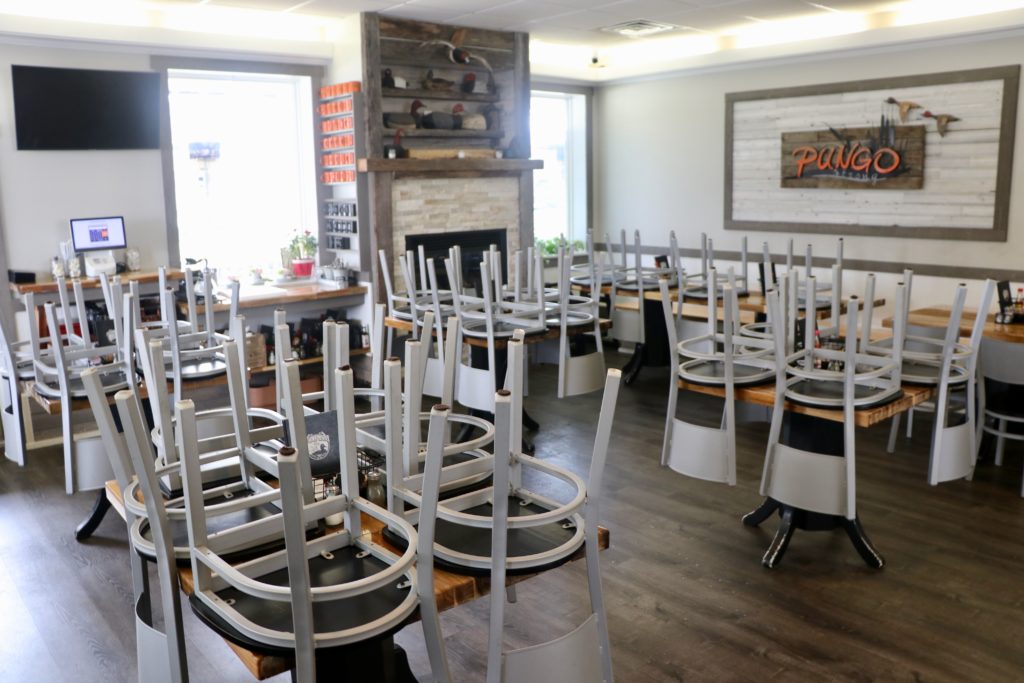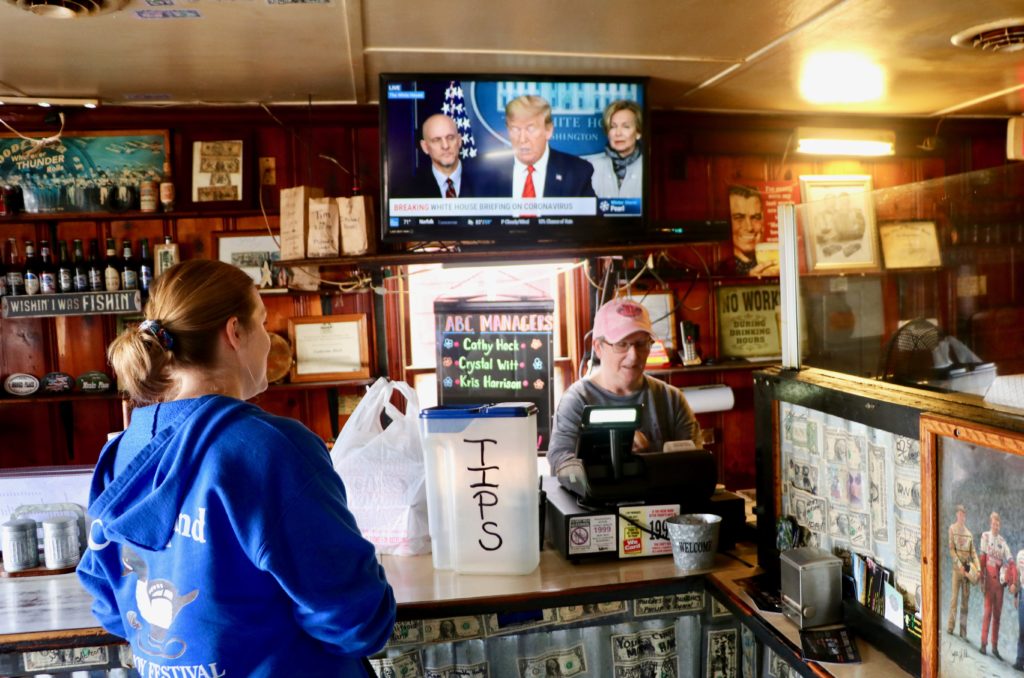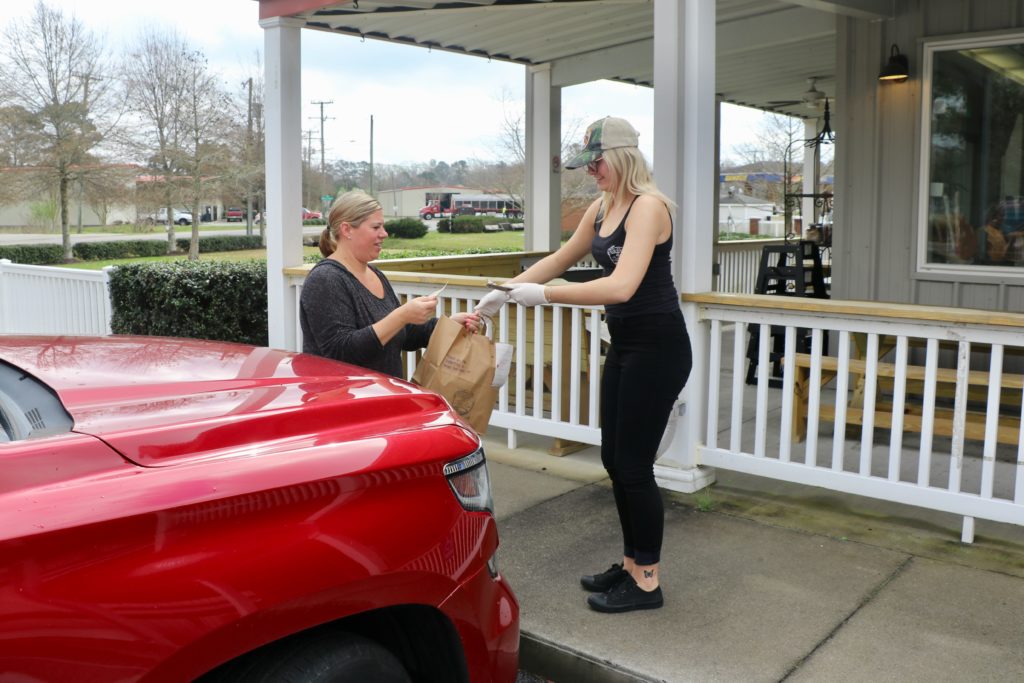
VIRGINIA BEACH — Gov. Ralph Northam’s executive order to protect Virginians from the spread of the new coronavirus made sweeping changes to life throughout the commonwealth, but the hospitality industry in this resort town, the state’s largest city, felt the changes acutely.
The hospitality industry is suffering as the main tourist season approaches, and restaurants have been forced to close dining rooms to help prevent people from spreading the virus, which can cause a disease called COVID-19.
Many restaurants have laid off staff, limited hours, and, for those that have not closed amid the emergency, business models are adapting for curbside pickup and delivery.
Even before the executive order, Redhead Bay Café, a Creeds restaurant that is less than a year old, changed its model to curbside pickup and delivery, and the restaurant offered family style meals to appeal to customers.
“After the winter, it’s our time to shine,” said Aristotle Cleanthes, co-owner of the café, on Thursday, March 19. “What I’m most disappointed in is the weekends. That keeps us afloat.”
In the following days, he was trying to keep staff busy and employed. He said he is grateful for community support amid the pandemic — and he feels for every small business weathering the same storm.
“At the end of the day,” he said, “it’s the heart of America.”
After this story first appeared in print on Sunday, March 29, the owners had to make the difficult decision of temporarily closing the doors. In a note to social media, they wrote that they hope to be back to normal operations soon.
About 9 percent of all jobs in Virginia are in restaurant or food service, and that is a growing piece of the state’s employment numbers, according to the National Restaurant Association.
Nationally, the industry has lost at least 3 million jobs and $25 billion in sales since Sunday, March 1. Seven in 10 restaurant operators have laid people off, according to information released by the association on Thursday, March 26. Many more believe further layoffs and hour reductions are coming.
More than half the restaurants in the country have changed to sales for off-premises consumption only. In Virginia Beach, restaurants were turning toward takeout and curbside pickup service before Northam’s order tightened restrictions even more.
In some cases, restaurants had been operating limited dining room service. After the order, dining rooms are closed – and so are some restaurants, if only temporarily.
Industry leaders and restaurateurs are sounding the alarm that local restaurants of all kinds — from neighborhood mom-and-pops to locally owned franchises — need help in the form of ordering takeout, buying gift cards from those who offer them and tipping well, if you can.

“We’re devastated,” said B.J. Baumann, president of the Virginia Beach Restaurant Association and owner of Rockafeller’s Restaurant on Rudee Inlet.
Baumann said she hopes people will help by buying gift cards and placing takeout orders, though she noted that restaurants that rely upon dine-in customers are not making up what has been lost with takeout. “We’re basically just trying to keep enough money coming in to keep our employees working.”
She said restaurants have a long tradition of supporting charities and community organizations, but now the industry needs support from its neighbors.
“I guess this is the time we reach out to the community and say we need help,” Baumann said.
“This is totally unprecedented,” she said. “We have gone through tough times before with recessions, hurricanes, fires … Nothing compares to this magnitude for everyone. It is absolute devastation to all restaurants, at this point. I urge the community to order as much as they can from restaurants that are still open.”
She said the association is offering free memberships for any restaurant that wants to join so they can get current, accurate information about issues when they arise. Additionally, the association website – dineinvb.com – lists member restaurants that are operating and how they have adjusted their businesses to keep going and serving their customers.
The Virginia Beach City Council is faced with an uncertain economic forecast and uncertainty about when business will return to something approaching usual, but the body is poised to consider taking steps to relieve pressure on the hospitality industry in the coming weeks.

City Councilmember Guy Tower, who represents the Beach District, on Tuesday, March 17, sent an email to his colleagues on the council and Acting City Manager Tom Leahy, urging financial relief to the hospitality industry, among others.
Noting that his district, which includes the main resort area, is being hit hard by shutdowns, he wrote:
“The unfolding global health pandemic is striking particularly hard at our hospitality industry, so vital to our city’s economic health and that of the many members of our community who are employed by our hotels and restaurants. Due to cancellation of events and bookings, hoteliers who have survived the annual downturn in business during the winter months, are now facing loss of expected spring bookings that would begin to restore them to profitability. Some will likely close ‘for the duration.’”
He added, “In pursuit of social distancing, restaurant dining rooms are empty. A few have locked their doors. Others have skeleton crews working to fulfill delivery and carry-out orders.”
In an interview on Friday, March 27, Tower said he hopes to discuss ordinances that would, among other things, waive late fees and give extensions for meals, admissions and transient occupancy taxes.
“These would be retroactive to the beginning of the emergency,” Tower said.
He said he understood many businesses and citizens are suffering amid the emergency, but hospitality businesses clearly have been hit hard.
For restaurants, he said, it has been catastrophic.
“From just an economic standpoint, it’s just shockingly bad,” he said. “I feel very sorry for the owners, the managers, the people laid off and even the people who still have jobs. It’s got to be depressing as hell, under these circumstances. They’re used to being hospitable. Now they are pushing food out the door.”
Acting City Manager Tom Leahy in a Friday, March 27, letter to the City Council summarized various draft ordinances.
Possible steps include asking City Treasurer Leigh Henderson not to take collection actions against businesses paying such taxes during the pandemic. And waivers of fees and extensions for real estate and personal property taxes also are proposed, as are avoiding collection actions on those taxes during the emergency.
In his letter, Leahy noted that property taxes are a major revenue source for the city government, and he recommended waiting in regard to real estate and property taxes. He also said the treasurer “may provide relief to the significantly impacted hotel and restaurant sector by waiving late fees and penalties” for taxes and working out payment plans.
In a memorandum on Friday, March 20, Henderson wrote that she is waiving late payment penalties on meals, lodging and admission taxes that were due on the 20th through the end of March. Henderson wrote that the timing of the next council meeting “may not provide the immediate relief that is so desperately requested by hoteliers and restaurants.”
Henderson sought council support to allow businesses to pay these taxes after the emergency and in installments, and then businesses could work out a formal repayment plan once the emergency is lifted.
City Councilmember Aaron Rouse, who holds an at-large seat, in a Tuesday, March 17, work session discussed a draft resolution he and Henderson requested that would direct Henderson and Commissioner of the Revenue Phil Kellam not to impose penalties and interest on some local taxes during the pandemic. That measure addressed business more broadly, and focused upon personal property, meals, transient occupancy and admissions taxes.
Rouse urged colleagues to become cosponsors “as a way to bring calmness to the business community who aren’t able to bring in any type of revenue, but the bills are still piling up.”
“When people get back on their feet, they can get back to handling their business,” Rouse told his colleagues on the council. “But this resolution is just a way to bring a sense of calm to our community and to let them know that our council understands that businesses aren’t operating like they used to.”
During a telephone interview last week, Mayor Bobby Dyer said the city will work to help businesses and citizens amid the crisis.
“There are people out there who are hurting,” he said. “There are businesses that are vulnerable.”
© 2020 Pungo Publishing Co., LLC

